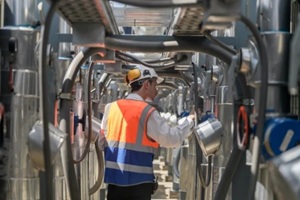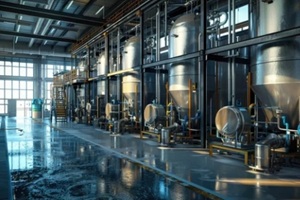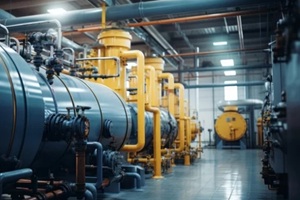 Autumn brings more than just changing leaves for property managers and facility teams. As temperatures drop, the pressure rises to ensure heating systems are ready for the demanding winter ahead. But who handles what during this critical transition?
Autumn brings more than just changing leaves for property managers and facility teams. As temperatures drop, the pressure rises to ensure heating systems are ready for the demanding winter ahead. But who handles what during this critical transition?
Let’s demystify the startup process and clarify the roles between your team and your water treatment partner, helping you avoid system failures that could leave your building in the cold.
Why Getting Boiler Startup Right Matters
The successful collaboration between building staff and water treatment professionals during boiler startup directly impacts your heating system’s reliability, efficiency, and longevity. A proper startup can mean the difference between a smooth heating season and devastating system failures, skyrocketing energy costs, or complete system shutdown when you need it most.
Missing critical steps or unclear responsibilities can lead to serious issues like scale formation, corrosion damage, or energy inefficiency that could have been prevented with proper expertise. Whether your building operates on steam or hot water, proper startup is essential.
Steam boilers operate at higher pressures and temperatures, requiring specialized treatment to address steam quality, condensate return, and oxygen removal. Hot water boilers, while operating at lower pressures, still need careful chemical treatment to prevent corrosion and scale formation. Understanding your system type helps ensure appropriate treatment procedures are followed.
The Essential Steps to Boiler Season Success
Building Staff and Management Responsibilities
Starting your heating system preparation by early September is crucial. This timeline provides your team adequate time to identify and address potential issues before the first cold snap hits, typically in mid-October.
The first step is conducting a comprehensive mechanical inspection. Your team must test all safety devices, particularly focusing on low water cutoffs and pressure relief valves. A thorough examination of electrical connections and controls comes next, followed by inspection of the combustion chamber and burner assembly.
For steam systems, the condensate return system requires special attention. For hot water systems, makeup water and expansion tank components need thorough review, as these are vital to efficient operation.
After completing inspections, system preparation becomes the focus. Your maintenance team should clean and inspect all strainers to ensure proper flow. Verification of system valve positions prevents operational issues once running.
 Steam systems require verification of condensate pump operation and steam trap function, as failed condensate return leads to increased energy costs. Hot water systems need proper expansion tank pressure and circulation pump operation confirmed. The final phase involves careful system filling and startup procedures. Begin with slow system filling to prevent thermal shock.
Steam systems require verification of condensate pump operation and steam trap function, as failed condensate return leads to increased energy costs. Hot water systems need proper expansion tank pressure and circulation pump operation confirmed. The final phase involves careful system filling and startup procedures. Begin with slow system filling to prevent thermal shock.
Proper venting of air from all points becomes critical – trapped air causes circulation problems and reduced efficiency. System pressure requires constant monitoring during filling. For steam systems, proper warm-up prevents thermal stress on condensate lines. For hot water systems, ensuring proper circulation through all zones is essential. Document initial pressure and temperature readings for future reference.
Water Treatment Professional Responsibilities
Your water treatment partner should begin their pre-season assessment by late August. This process starts with reviewing previous treatment records to identify recurring issues. Current system conditions need testing to establish a baseline. Chemical feed equipment requires inspection to ensure reliable delivery throughout the heating season.
System preparation comes next. Based on assessment, your water treatment professional determines if cleaning is necessary, verifies chemical feed equipment operation, and ensures proper chemical storage and delivery systems.
The implementation of proper chemical treatment follows. Your water treatment partner establishes the correct program based on your specific system type. For hot water systems, this includes corrosion and scale inhibitors. Steam systems require additional treatment including oxygen scavengers and condensate line protection. Precise feed rates are established and initial water chemistry parameters documented.
Successful ongoing management requires clear protocols. Your water treatment partner establishes testing requirements specific to your system type, trains staff on daily procedures, schedules monthly service visits, and provides detailed chemistry reports to identify developing trends. Steam systems require additional condensate testing and treatment monitoring, while hot water systems need regular dissolved oxygen and inhibitor level verification.
Is Your Water Treatment Program Protecting Your Investment?
 Watch for warning signs that indicate your system needs professional attention. Lack of regular site visits, incomplete water test reports, and inconsistent chemical inventory levels signal inadequate treatment. If your current provider can’t clearly explain their treatment approach or fails to provide comprehensive documentation, your system may be at risk.
Watch for warning signs that indicate your system needs professional attention. Lack of regular site visits, incomplete water test reports, and inconsistent chemical inventory levels signal inadequate treatment. If your current provider can’t clearly explain their treatment approach or fails to provide comprehensive documentation, your system may be at risk.
Operating without professional water treatment creates even greater dangers. The cost of replacing a boiler damaged by poor water chemistry far exceeds the investment in proper treatment. Your water treatment partner should provide more than just chemicals – comprehensive programs should include regular testing, detailed reporting, staff training, and emergency support. If your current program lacks these elements, it’s time to consider a change.
Protect Your Investment with Professional Water Treatment
Tower Water has built our reputation by doing things right from the start. Our experienced professionals work seamlessly with your facility team, providing clear communication, documentation, and training that empowers your staff. From historic Manhattan high-rises to modern commercial complexes, we understand the unique challenges of protecting heating systems across New York City and New Jersey.
Don’t wait for problems to reveal gaps in your water treatment program. Ready to do it right from the start this autumn? Contact us at (888) 539-1559 or visit here to learn how our water treatment expertise can help protect your heating system investment and provide reliable operation all winter long.
